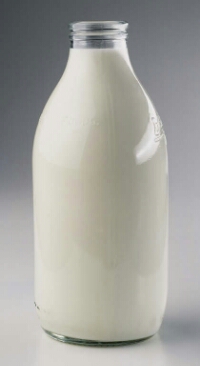
Among the items in its ‘Monday Thumbs Up/Thumbs Down’ editorial, the Gazette argues against allowing Wisconsinites to drink organic milk (subscription req’d).
It’s not merely that the paper’s editorial board thinks that drinking raw imprudent (pointing to illness from a recent incident), it’s that the board thinks sales should remain illegal.
Without a law, the paper frets that some people might choose raw milk, and a fraction of those people would get sick, and that would sink Wisconsin’s dairy industry:
Thumbs down to consuming raw milk. There’s a good reason to use pasteurization, which kills pathogens by heating milk to high temperatures, a process named for the scientist who discovered it, Louis Pasteur. In Durand, 38 people, including many players, were stricken after drinking raw milk at a football team potluck Sept. 18. The Milwaukee Journal Sentinel reported that nine people were hospitalized and racked up thousands of dollars in care expenses. The team had to forfeit a game because so many players were ill. Except for limited, incidental sales, state law prohibits sales of unpasteurized milk. Still, advocates claim the law should change to give people access to fresh, unprocessed milk direct from farms. Nonsense. In America’s Dairyland, the reputation of our agriculture products is crucial. This Durand incident should dispel any notion of changing state law
This argument assumes that consumers in Wisconsin or elsewhere would not adequately distinguish between organic and raw milk from our state, and would – generally – shun all milk produced here.
I’m not in the least persuaded that consumers locally or in other states are so undiscriminating: it’s as though consumers would be too dense or too panicked to tell whether a carton’s label said pasteurized or organic.
Big Dairy often presents an argument of this sort: we can’t risk the reputation of Wisconsin’s pasteurized milk – but what they really mean is that they think (or want you to think) that consumers are incapable of reading a label well enough to distinguish between one that says PASTEURIZED and one that says ORGANIC.
On the contrary, shoppers are more than capable of reading a label, as they do each day when choosing between items. Believing people little more than unthinking, this brings the editorialist to contend that regulation of a simple product, easily labeled, is vital to protect people from themselves.
We’ve no need to ban organic milk to protect Big Dairy any more than we have to ban motorcycles on the theory that motorcycle accidents might give highway driving a bad name. If motorcycles should be riskier, that’s a choice for motorists to make when picking a vehicle. In any event, the presence of motorcycles on the road hasn’t stopped people from buying cars & trucks.
As has been true so many times before, the Gazette‘s editorial board erroneously writes about people as though they were dim and dull. America would not have advanced across a vast continent, and developed a modern technological society, if people were even half so dull as they Gazette depicts them.
Honest to goodness, does the Gazette‘s editorialist think that Janesville’s residents have not even advanced beyond elementary school? He must have doubts, as he pedantically reminds the paper’s readers that pasteurization is a process that Louis Pasteur first developed.
Next he’ll remind readers that Washington, D.C. is named for George Washington, and Ford automobiles come from a company that Henry Ford founded.
In a free marketplace of ideas and news, even the supposedly worst rumors quickly dissipate when confronted with sound analysis. Initial concerns about infectious diseases (far different & worse than occasional nausea from milk) quickly fade when people correctly report the genuine difficulty of those diseases spreading in our society.
People are more than capable, for themselves, of deciding which kind of milk, if any, to drink. They’re equally capable of forming an opinion about the risks from different kinds of milk without attributing the same reputation to each kind. Government’s prohibitions aren’t required.
That’s not nonsense; it’s the reasonableness abounding within ordinary life.
